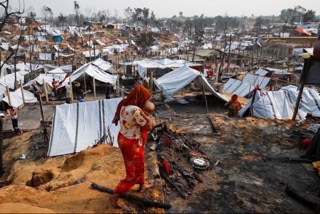by Oleksandra Volakova
As of September 2023, more than 114 million individuals were forcibly displaced worldwide, which is rapidly increasing. You and your friends have probably always lived in one place, leaving it mostly for traveling. Because of this, it is complicated to understand the daily hardships and problems refugee people face. Unless you will become one of them.
On Thursday and Friday of the last week, April 11-12, Wesleyan students and faculty had a chance to immerse into the life of a refugee who must flee his country because surviving in it is not possible anymore. This event, organized by Anita Deeg-Carlin and the Office for Intercultural Learning and conducted by the Jesuit Refugee Service, showed each of the attendees a story of the fleeing of a particular person, a human being, just the same as us, but whose life turned upside down – not “refugees” as a general statistic. We tried to stay alive through many exercises, leaving the country and crossing the borders.
At first, participants discovered some information about a person in whose shoes they would be today. Information included age, country, amount of money, family members and situation, illnesses, and significant life incidents. Based on this information, we had one minute to decide what items would help us flee the country; we could choose just three things out of: cell phone, passport, diploma, blanket, religious book, water, etc. There were no right or wrong answers because refugees never knew what would be necessary on their journey; they tried to go with the best guess.
Another exercise (if we successfully got to the border) was to go through smugglers to be able to flee a country. The price they require to go through can change every second as much as they wish, and that’s why some people cannot cross the border because of the lack of money. Sometimes, people who cannot cross the border stay in refugee camps, hoping to be able to do so later. Unfortunately, it is almost impossible to survive those camps or leave them. Statistically, 30-40% of refugees live in those camps because they cannot cross the border or find a place to stay abroad. UNHCR has requirements for the camps that demand minimal living conditions. However, even they are not fulfilled – most people live below the extreme poverty line and have no clean water or minimal food supplies, hygiene products, and a place to sleep. It causes unending illnesses, pandemics, violence, and murders spreading among residents.
As a result of those exercises, only one out of 10 participants was able to stay alive and successfully overcome all the hardships on the way to another country. Securing a job, food, and a house, speaking another language, the attitude of citizens toward refugees, the stress displaced people experience, and always haunting memories of their past will not allow them to live carelessly.
Seeing life through the lens of forced migration helps stop depersonalizing real human tragedy and drama and stop seeing refugees simply as statistics. Those exercises aimed to be more welcoming towards refugees and stand in solidarity with them.
Sponsors for this event include the Albritton Center for the Study of Public Life, Fries Center for Global Studies, and the History, Latin American Studies, and African Studies Departments.



